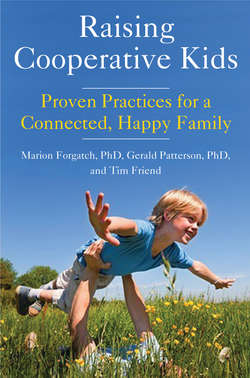Читать книгу Raising Cooperative Kids - Marion S. Forgatch - Страница 14
На сайте Литреса книга снята с продажи.
Long-Term and Short-Term Goals
ОглавлениеLong-term goals can feel like impossible dreams, especially if you have to travel far to reach them. Yet, goals serve as magnets that draw you forward. Since every journey begins with a single step, make the first steps in your goal statement easy to achieve, and then enjoy a bit of success. One of your goals is probably to raise happy, well-adjusted, and cooperative children—after all, you're reading this book. But that may seem like a tall order.
When formulating your goal statements, begin by making two lists—one for your long-term dreams for your children and one for more immediate goals, things that can happen today or this week. For the long-term goals, think big. Be ambitious. Most parents say they want their children to be happy, healthy, resilient, self-disciplined, skillful, independent, and cooperative. This list describes general qualities that reflect your values, which are like points on a compass that draw you in certain directions. Next make a list of the small steps needed to achieve your long-term goals. As parents, we can influence long-term outcomes for our families, but to do that, we have to take little actions day by day. Life is a process of ongoing change that you control when you convert goals into tiny steps.
Parents' lists of short-term goals tend to include daily behaviors like doing chores independently, following rules, being respectful, and cooperating with directions. These short-term lists involve behaviors that form habits. When habits are appropriate, they lead to well-being. Moreover, your children's well-being depends a lot on your own habits. We all have good habits and bad habits. Once we have families, we need to think about how our habits influence our children's behavior.
Now, make another list that focuses on your strengths as a person and as a parent. Then make one of your children's strengths, taking into account their unique qualities. Many parents find making a list of their own strengths challenging. If you have trouble with this, think about times when you felt good about something you accomplished, or something your children did that made you feel proud, and take ownership of your contribution.
When the challenges of raising a family seem overwhelming—and maybe not even worth the extraordinary effort—pull out your list of personal strengths and review it. Some of the strengths parents have identified for themselves include patience, warmth, honesty, perseverence, commitment, and fairness. When you are disappointed in the mistakes and choices your children make, take a look at the list you made of their strengths. Parents have identified some of these qualities as honesty, kindness, devotion, humor, adventurousness, and persistence. Once you make your lists, keep them in a safe place and add to them whenever you feel good or something special happens.
When we think about change, we often focus on what is wrong—what needs fixing. This is easier than noticing what you and children do right. Some of the most common complaints we hear from parents about their children's behavior include stubbornness, unwillingness to accept “no” for an answer, whining, arguing, temper tantrums, noncompliance, bedtime problems, bad attitude, procrastination, disrespect, carelessness, thoughtlessness, self-centeredness, and fear of trying new things. Review the elements of a successful goal statement as you turn these problem behaviors into active goal statements. Remember that a goal statement says what you want so clearly that a stranger will understand what you mean: it is future-oriented and positively framed, and it can be broken down into small steps. Goal statements have the same basic ingredients whether you want to raise cooperative children, read a novel by Isabel Allende in Spanish, lose weight, or catch a trout.
Let's apply these ingredients to several common behavioral problems.
Notice how often the positive opposite for a problem behavior is compliance or cooperation. For most parents, complaints boil down to the fact that their kids just don't follow directions—at least not without an argument. Some parents say their children use a disrespectful tone of voice when talking to them, or roll their eyes, or. . . you name it. These are not cooperative behaviors.
The building blocks for attaining goals like resilience, independence, self-discipline, and happiness all tend to be based on cooperation. Cooperation involves working together with a spirit of collaboration or teamwork. Cooperative people are pleasant to be around. They are helpful and kind. Parents everywhere say they want their children to follow directions pleasantly, play by the rules, and get along with others, especially family members. When family members cooperate with each other, they enjoy each other's company. The question is how do you bring this about?
